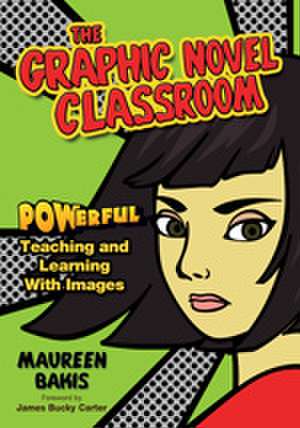The Graphic Novel Classroom: POWerful Teaching and Learning With Images
Autor Maureen M. Bakisen Limba Engleză Paperback – 9 ian 2012
Preț: 247.52 lei
Nou
Puncte Express: 371
Preț estimativ în valută:
47.37€ • 48.94$ • 39.40£
47.37€ • 48.94$ • 39.40£
Carte tipărită la comandă
Livrare economică 20 martie-03 aprilie
Preluare comenzi: 021 569.72.76
Specificații
ISBN-13: 9781412936842
ISBN-10: 1412936845
Pagini: 176
Dimensiuni: 178 x 254 x 20 mm
Greutate: 0.36 kg
Ediția:1
Editura: SAGE Publications
Colecția Corwin
Locul publicării:Thousand Oaks, United States
ISBN-10: 1412936845
Pagini: 176
Dimensiuni: 178 x 254 x 20 mm
Greutate: 0.36 kg
Ediția:1
Editura: SAGE Publications
Colecția Corwin
Locul publicării:Thousand Oaks, United States
Recenzii
"There may be other books that promote the use of graphic novels, but none that are so specific or offer such concrete, user-friendly lessons. I really enjoyed reading this book—and now I want to read and teach some of these graphic novels."
"This book shows without a doubt how a graphic novel can foster deep thinking, vibrant discussion and multiple opportunities for writing with a purpose."
"This book provides a great framework for structuring a graphic novel English language arts class. The practical rationales for using these texts, as well as the activities included, do meet the need for a book aimed at ELA in instruction with graphic novels."
"This book is very readable and makes a clear case for using graphic novels. More importantly, it provides readers with examples that they can use in their classrooms. It’s very practical, yet challenging."
"Even if you don’t want to (or can’t) teach graphic novels, this book offers so many wonderful ideas adaptable to other texts about how to get students thinking about what they read."
"High school English teacher and graphic novel advocate Maureen Bakis offers educators a guide for using comics as teaching tools, based on her own experience. She examines the compositional elements of comics using several volumes as examples and demonstrates how they can be used to teach different concepts and skills."
'This informative teacher's guide demonstrates how McCloud's Understanding Comics can be utilized in class and offers tried-and-tested ideas for the classroom, taking select graphic novels as an example'
"This book shows without a doubt how a graphic novel can foster deep thinking, vibrant discussion and multiple opportunities for writing with a purpose."
"This book provides a great framework for structuring a graphic novel English language arts class. The practical rationales for using these texts, as well as the activities included, do meet the need for a book aimed at ELA in instruction with graphic novels."
"This book is very readable and makes a clear case for using graphic novels. More importantly, it provides readers with examples that they can use in their classrooms. It’s very practical, yet challenging."
"Even if you don’t want to (or can’t) teach graphic novels, this book offers so many wonderful ideas adaptable to other texts about how to get students thinking about what they read."
"High school English teacher and graphic novel advocate Maureen Bakis offers educators a guide for using comics as teaching tools, based on her own experience. She examines the compositional elements of comics using several volumes as examples and demonstrates how they can be used to teach different concepts and skills."
'This informative teacher's guide demonstrates how McCloud's Understanding Comics can be utilized in class and offers tried-and-tested ideas for the classroom, taking select graphic novels as an example'
Cuprins
Preface
Acknowledgments
Introduction: Welcome to the Graphic Novel Classroom
Part I. Looking at Literacy in the Graphic Novel Classroom
1. Looking at the Comics Medium
Scott McCloud’s Understanding Comics
2. Interpreting Images
Shaun Tan’s The Arrival
Rachel Masilimani’s Two Kinds of People
Gene Leun Yang’s American Born Chinese
3. Looking at the Big Picture
Will Eisner’s A Contract with God and A Life Force
Part II. Looking at Memoir in the Graphic Novel Classroom
4. Pictures, Perception, and the Past: Teaching Marjane Satrapi’s Persepolis
5. Legacies & Images: Teaching Art Spiegelman’s Maus, Elie Weisel’s Night, and Scott Russell Sanders’ “Under the Influence”
Part III: Looking at Superheroes in the Graphic Novel Classroom
6. A Glimpse at the Superhero Genre: Teaching Frank Miller’s Batman: The Dark Knight Returns
7. Making the Invisible Visible: Teaching Alan Moore’s V for Vendetta
Afterword: The Value of Teaching Graphic Novels in School
Resources
References
Index
Acknowledgments
Introduction: Welcome to the Graphic Novel Classroom
Part I. Looking at Literacy in the Graphic Novel Classroom
1. Looking at the Comics Medium
Scott McCloud’s Understanding Comics
2. Interpreting Images
Shaun Tan’s The Arrival
Rachel Masilimani’s Two Kinds of People
Gene Leun Yang’s American Born Chinese
3. Looking at the Big Picture
Will Eisner’s A Contract with God and A Life Force
Part II. Looking at Memoir in the Graphic Novel Classroom
4. Pictures, Perception, and the Past: Teaching Marjane Satrapi’s Persepolis
5. Legacies & Images: Teaching Art Spiegelman’s Maus, Elie Weisel’s Night, and Scott Russell Sanders’ “Under the Influence”
Part III: Looking at Superheroes in the Graphic Novel Classroom
6. A Glimpse at the Superhero Genre: Teaching Frank Miller’s Batman: The Dark Knight Returns
7. Making the Invisible Visible: Teaching Alan Moore’s V for Vendetta
Afterword: The Value of Teaching Graphic Novels in School
Resources
References
Index
Notă biografică
Descriere
If you are looking for texts that will jumpstart learning and inspire students to love reading, this book provides the superpower you need! The author shows teachers how to use graphic novels to teach 21st-century skills, improve reading comprehension, promote literacy learning, and motivate students to read.
